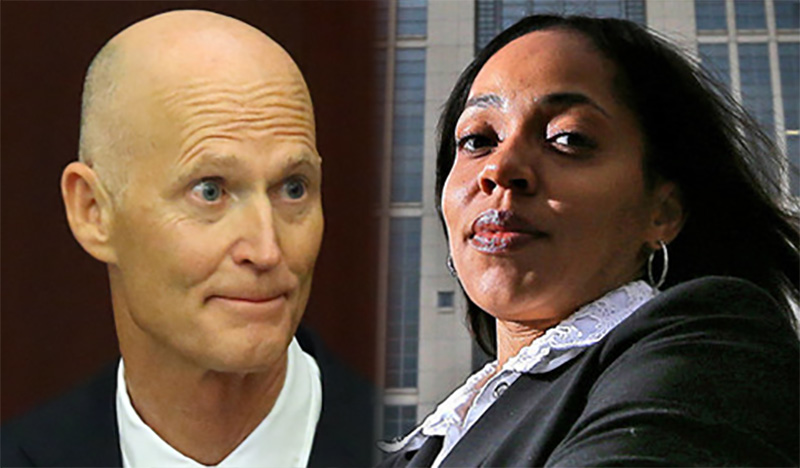
Does Florida’s governor have the power to take away a prosecutor’s case if he disagrees with a decision not to seek the death penalty?
The state’s highest court will hear arguments Wednesday over that question in a legal fight between Gov. Rick Scott and State Attorney Aramis Ayala, whose district covers the Orlando area.
Their fight began in March when Ayala, a Democrat, said her office would no longer seek the death penalty, explaining the process is costly, it’s not a crime deterrent and it drags on for years for the victims’ relatives. Ayala announced her decision as her office was starting to build a case against Markeith Loyd in the fatal shooting of an Orlando police lieutenant and his pregnant ex-girlfriend. With her decision, Ayala, intentionally or not, thrust herself into the forefront of the anti-death penalty movement.
Scott, a Republican, responded by reassigning her office’s death penalty cases to a prosecutor in a neighboring district, and top Republican lawmakers in Tallahassee announced budget cuts to Ayala’s office.
A spokeswoman for Ayala this week said she wouldn’t be talking about the case before the hearing.
In court papers, Ayala argued that it was unlawful for Scott to take away her cases since she is independently elected by voters, and that he could only remove her from cases for “good and sufficient reason,” none of which were present in their disagreement over the death penalty.
“Removing an elected prosecutor from a case because of a disagreement over her exercise of discretion is unprecedented,” Ayala’s attorneys said in court papers. “Every day state attorneys here in Florida make important decision on who to charge, what to charge, and what to prioritize. Giving the governor the tremendous and unfettered discretion to interfere in that decision making, would be unprecedented and could undermine the entire justice system in Florida.”
Scott argued in court papers that Ayala is refusing to follow Florida law by making a blanket decision not to seek the death penalty, and that her decision sets a dangerous precedent.
“The novel and extraordinary constitutional authority Ayala asserts, if accepted, will not just apply to prosecutors who decline to enforce the state’s death penalty laws. It will also apply to prosecutors who disagree with other kinds of criminal laws and penalties, including, for example, hate-crimes enhancements, laws that ban the open carrying of firearms and campaign finance regulations,” Scott’s attorneys said in court papers.
Florida’s death penalty has been in flux for the past year or so.
Executions in Florida ground to a halt last year after the U.S. Supreme Court declared the state’s death penalty sentencing law unconstitutional because it gave too much power to judges. The Florida Legislature responded by overhauling the law to let the death penalty be imposed by at least a 10-2 jury vote. The state Supreme Court struck down the law and required unanimous jury decisions for capital punishment. Earlier this year, the Legislature passed a bill requiring a unanimous jury recommendation.
Ayala, who previously worked as a public defender and prosecutor, was a virtual unknown when she ran for state attorney last year. With an infusion of more than $1 million from a Washington-based political action committee with ties to liberal Hungarian-born U.S. billionaire George Soros, Ayala unseated the incumbent state attorney in the Democratic primary and became Florida’s first African-American state attorney.
In her campaign, she promised to listen to communities that hadn’t had a voice in the past. Given that Florida’s death sentence was in a legal holding pattern at the time, capital punishment never came up during Ayala’s campaign.
A host of civil rights activists and legal scholars have come out in support of Ayala. Lawmakers in the Republican-dominated Florida House, and other state attorneys, have denounced her decision.
“Ms. Ayala effectively abolished the death penalty … by implementing a hard-and-fast rule that removes her decision-making on a case-by-case basis, which is beyond the scope of her prosecutorial independence and discretion,” the Florida Prosecuting Attorneys said in court papers.
Ayala has also sued Scott in federal court, but asked it to wait until the Florida Supreme Court lawsuit is resolved.
Republished with permission of The Associated Press.



